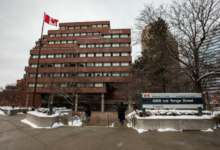Bedbugs, cockroaches, mice gaining ground in TCH properties, reports show
Pests — cockroaches, bedbugs, and mice — appeared to be on the rise in Toronto Community Housing buildings last year, according to two new reports.
In one document, the public housing agency’s staff say demand for pest control treatments jumped almost 18 per cent in 2019, compared to the previous year.
And the problems became more acute as the year wore on, according to a separate TCH report.
None of which comes as a surprise to Catherine Wilkinson, a 20-year TCH resident who until recently was a tenant representative on the board.
“Some tenants are actually suicidal, where they take medication to cope, particularly when it comes to bed bugs,” she said in a deputation to the board’s tenant committee two weeks ago.
“I don’t think our tenants should have to live with these pests and we need to do everything to make sure that they don’t.”
TCH declined to speak on camera with CBC Toronto about the reasons behind 2019’s increased demand for anti-bug and rodent treatments. But in an emailed statement, the agency blamed, in part, a city-wide surge in rat and mouse populations.
The problem is “due to increased construction,” according to the corporation.
Increased treatments
“Toronto Community Housing is committed to delivering clean, safe buildings and improving living conditions for tenants,” the statement reads in part.
“As part of our prevention focus, [TCH] has increased its treatments standards by carrying out three treatments in a unit rather than two.”
In one of two reports to this week’s meeting of the TCH board, chief operating officer Sheila Penny presents numbers that show about 62,000 anti-pest treatments at TCH units by the end of 2019. That compares to about 53,000 in the previous year.
In particular, beg bugs appear to be leading the charge. The numbers show about 5,700 treatments in the first quarter of the year. In the last quarter, there were almost 7,000, and a year-end total of about 25,000 treatments.
‘A lot of cockroaches’
Next up were cockroaches with a total of about 16,300 treatments by the end of 2019. Mouse treatments trailed at 11,300 treatments that year. Treatments for a final category of pest, “other,” totalled about 8,300 by the end of 2019. TCH says that includes ants and pigeons.
Ilona Bata was one of the tenants who asked for help with pests in 2019. She said her Oak Street apartment became infested just after a neighbour moved out.
“There was a lot of cockroaches,” she told CBC Toronto. “I mean, my kitchen was running with them.”
Bata, who’s on disability, said TCH did one spraying, but there was no follow-up. She said a personal care worker disinfected her kitchen, which solved the problem.
‘People bring in bedbugs’
Bata said tenants should do more to keep their apartments clear of pests.
“My trick is I don’t let nobody in my apartment, because people bring in bed bugs; people from the street, people from different apartments,” she said. “If they have bedbugs they’re going to bring them in and share them with you.”
The report is to be presented at the Feb. 20 board meeting.
The TCH statement points out that in 2018, the agency “spent about $2.4 million and we’ve increased our spending in 2019 as a result of our enhanced proactive response, including full building assessments and treatments, as well as enhanced measures such as heat treatments (sometimes used in units for health reasons) and canine detection.”
The cost of the 2018 mitigation effort wasn’t immediately available, the statement says.
Penny’s report says staff responding to pest control complaints discovered other problems, which they were then able to address:
“Of all the units visited by the Environmental Health Unit in 2019, more than 425 households demonstrated a need for additional supports, including access to resources to support de-cluttering and preparation for treatment, furniture replacement, or extreme cleaning services,” her report notes.
“It is staff’s experience that there continues to be an upward trend in support needs for tenants.”
The report also points out that the number of pest control treatments in the agency’s rent-geared-to-income units “was substantially greater than those completed in market rental units.” No reason is given for the difference.
Penny’s report concludes by warning the board that “the organization potentially faces orders/costs related to any perceived mismanagement including potential awards of rent abatement at the Landlord and Tenant Board, Municipal Licensing and Standards … orders for failure to maintain the premises “pest free,” and Health Protection orders from Toronto Public Health.”
CBC







Redes Sociais - Comentários